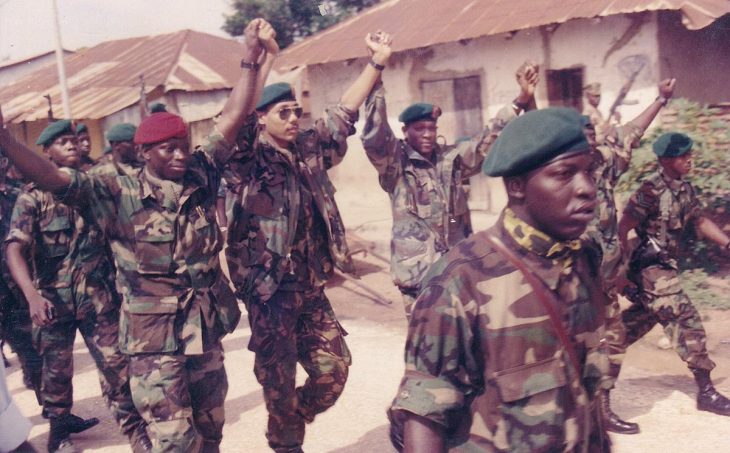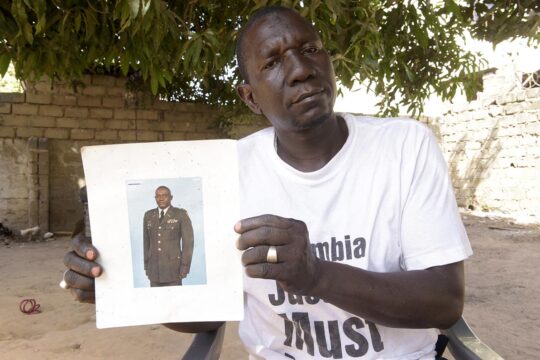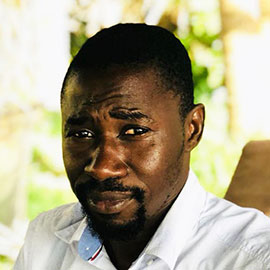The seventh witness to appear before Gambia’s Truth, Reconciliation and Reparation Commission (TRRC) spoke from behind tinted glass with a disguised voice. The protected witness was a member of the group of soldiers who took over the country in July 1994. He now revealed information on why close to two dozen soldiers were executed, on November 11.
Barely three months after the coup led by Yahya Jammeh, the leadership of the military junta announced that a counter-coup was set in motion by Lieutenant Basiru Barrow. Barrow, who was initially chosen by a majority of the soldiers for the junta’s leadership but lost it to Jammeh due to absence for an unspecified ailment, was said to have died in a fire fight at Gambia’s biggest military camp in Yundum, about 45 minutes’ drive from Banjul.
At least this was the official story until now.
According to the protected witness, close to two dozen soldiers were in fact arrested, lined up and shot in an execution style. “The army has never suffered a casualty of that caliber. A lot of soldiers, about 20 plus, were executed. I learned that they were executed at different places. They were lined up and shot one by one,” said the protected witness.
Betrayal and purges
The July 22 military takeover was done by junior officers in the army, and led by others who were lieutenants. Ill-planned, with no written speech prepared, according to their one-time spokesperson former second lieutenant Alagie Kanteh, who also testified before the Truth Commission, there was a “verbal agreement” that when the coup had succeeded, salaries of soldiers would be increased, welfare improved and that they would go back to their barracks after a three-month transition.
None of these things were honoured by Jammeh and his colleagues. The protected witness said this was perceived in the army as a betrayal by the junta, causing “disgruntlement” and “low morale in the army.” It is this disgruntlement that convinced the Armed Forces Provisional Ruling Council to make a move on November 11, the witness said. A purge of those suspected to be leading the young disgruntled soldiers was decided. Among those who attacked the Yundum barracks, captured and executed the soldiers, the witness named Edward Singhateh, Sanna Sabally, Yankuba Touray and Sadibu Hydara. They all came from the State House command. Among those killed were Lt. Basiru Barrow, Gibril Saye, Abdoulie Faye called Dout, Basiru Camara and one Manneh called Nyancho. The witness stated that these soldiers were executed in different locations, among them Brikama Firing range, Yundum and Fajara Barracks.
The alleged presence of senior officers Badgie and Jatta
The witness declined to publicly reveal what happened to him after the executions. Based on his testimony, he was arrested and put through some horrible conditions. The Commission’s lead counsel Essa Faal tried twice to get him to explain what he went through. The witness’s fear, however, was that explaining his ordeal would reveal his identity. He submitted a written testimony to the Commission which contained all the details, as well as a list of people he “knows and believes to have been killed by the junta”, said Faal.
But there was more surprise to come. The protected witness also stated that the country’s current national security adviser to President Adama Barrow, Momodou Badgie, and former chief of defense staff, Colonel Baboucarr Jatta, were present when soldiers were being executed. The witness, however, fell short of explaining what role, if any, Jatta and Badgie may have played in the execution. Badgie is currently leading the security sector reforms national agenda. The revelation of his alleged presence during the executions appeared on all major news outlets in the country and caused controversy on social media platforms, with many questioning how Badgie could reform a wrong he may have been part of. Every session of Gambia’s Truth Commission is featured live on television, radio and live-streamed on several online platforms with keen following.
A fluke
According to testimonies heard by the Commission, the soldiers who led the coup were at least partly unprepared, and they were unstable too. Kanteh who served as the junta’s spokesperson for ten days before he was sacked and jailed at Mile 2 prison, said Jammeh was enigmatic and highly “undisciplined”. He further described Captain Sanna Sabally as an “immature” and “temperamental” man who “cannot make good decisions”. He then qualified Captain Edward Singhateh as a “sadist” and Captain Yankuba Touray as a “clown”. Along with Sadibu Hydara, these men ended up in the driving seat of the junta.
Abubakarr Jeng, a former police commander who was detained at Mile 2 for 18 months because of his opposition to the coup, told the Commission that the coup succeeded partly because of command vacuum within the army due to the non-involvement of Nigerians.
At the time of the coup, the Gambian army was being commanded by Nigerians who were in the country on technical assistance to establish a professional army. When the coup happened, the Nigerians said they couldn’t get involved in what was an internal affair. Jeng said that the neutral stance of the Nigerians left a vacuum in the army, adding that the police, who could also counter the military, were poorly trained with inferior fire power. He concluded: “The July 1994 coup was a fluke. If there was a proper resistance, we would not be talking about 1994 today. It was poorly organized. These were angry people and you could even see that the leadership was not structured. You cannot stage a coup if you do not even have a statement in terms of the rationale.” And yet Jammeh and his men did, successfully.
VISIT TO THE NOTORIOUS MILE 2 PRISON
On November 18, Gambia’s Truth Commission investigating human rights violations under the regime of former dictator Yahya Jammeh, undertook a visit of the Security Wing of Mile 2, the small nation’s most notorious prison, often euphemized by Jammeh as “my hotel”.
The Security Wing was where several senior security officers and prominent former government employees, including ministers, were jailed and tortured following the 1994 military takeover. The area is partitioned from the State Central Prison’s Main Yard by a thick wall of about 4 meters tall with a thick black metal door. Several witnesses of TRRC have explained the fear that grips them any time they hear the noise of that door being opened. For them, the sound meant that they were either going to be tortured or taken away and killed.
“We have come here because it is important for us to understand what the witnesses are telling us,” said Lamin Sise, chairman of the Truth Commission, as he discussed with Ansumana Manneh, the director general of Mile 2. Part of the mandate of the commission is to recommend institutional reforms, said Sise, as he explained the rationale of their visit.
This was the first site visit for the TRRC. In the previous two weeks, the Commission had heard harrowing stories of witnesses who reportedly went through torture, mock execution and, in some cases, death in Mile 2, about 4 kilometers from Banjul, Gambia’s capital city.
The Security Wing currently holds 70 inmates. It is still next to what several witnesses described as a mosquito-infested swamp. Security Wing Number 1 is a 12-room cell built by the colonialists. Each room is about 3 by 2 meters, where people are kept in solitary confinement. This is where Commission witnesses such as the country’s former deputy police chief Ebrima Chongan, former captain Sheriff Gomez and current commander of the Gambian army Brigadier General Mamot Cham were detained.







